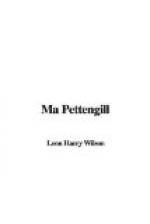Also the sick warrior turned down flat the arrowroot gruel and Irish-moss custard and wine jelly and pale broth. He had to have the same coarse food that is et by common working people who have had no home advantages, including meat, which is an animal poison and corrupts the finer instincts of man by reducing him to the level of the brutes. So Arline Plunkett says. Shelley had it, though, ordering it in a bass voice that made the statuary teeter. Steak was cooked in the Plunkett home for the first time since it had been erected, notwithstanding the horrible example it set to little Keats, who still had golden curls as lovely as Shelley’s once had been and was fed on fruits and nuts.
Arline couldn’t of had any pleasant time with her wandering boy them three weeks he was there. She suffered intensely over the ignominy of this mail that came to him by the awful name of Bugs, with the gossips in the post office telling it everywhere, so that the boys round the cigar store got to calling him Bugs right out plain. And her son seeming proud of this degradation!
And she couldn’t get him to protect himself from drafts by night. He’d insist on having a window wide open, and when she’d sneak back to close it so he wouldn’t catch his death of cold he’d get up and court destruction by hoisting it again. And once when she’d crept in and shut it a second time he threw two shoes through the upper and lower parts so it would always be open. He claimed he done this in his sleep, having got into the habit in the trenches when he’d come in from a long march and someone would close all the windows. But Arline said that this only showed that war had made him a rowdy, even in his sleep—and out of the gentlest-mannered boy that ever wore velvet garments and had a cinch on every prize in the Sunday school; though she did not use coarse words like that. She told me herself it was time we got this other side of what war did to gently nurtured youths that had never soiled their lips with an oath in their lives until they went into war’s hell. She said just that!
Also Shelley had contracted the vicious habit of smoking, which was all a body would want to know about war. She said he’d have his breakfast in bed, including whole slices of ham, which comes from the most loathsome of all animals, and would then lie and smoke the Lord Byron five-cent cigar, often burning holes in the covers, which he said was another old trench habit—and that showed what war done to the untainted human soil. Also while smoking in bed he would tell little Keats things no innocent child should hear, about how fine it feels to deflate Germans with a good bayonet. She had never esteemed Lord Byron as a poet, and these cigars, she assures me, was perfectly dreadful in a refined home, where they could be detected even in the basement.
Little Keats was now thirteen, with big joints and calf knees showing under the velvet pants, and I guess his curls was all that persuaded his mother to live, what with Shelley having gone to the bad and made a name for himself like Bugs. But little Keats had fell for his brother, and spent all the time he could with him listening to unpretty stories of Germans that had been fixed up proper the way the good Lord meant ’em to be.




